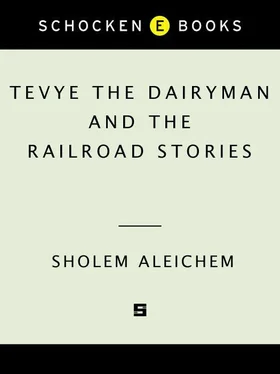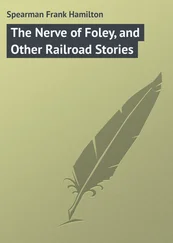(1899)
You’ve been wondering, have you, Pan Sholem Aleichem, where I’ve been all this time? Tevye’s changed quite a bit, you say, grown suddenly gray? Ah, if only you knew the troubles, the heartache, that I’ve been through! It’s written that odom yesoydoy mi’ofor vesoyfoy le’ofor , that a man can be weaker than a fly and stronger than steel — I tell you, that’s a description of me! Maybe you can tell me, though, why it is that whenever something goes wrong in this world, it’s Tevye it goes wrong with. Do you think that’s because I’m a gullible fool who believes whatever he’s told? If only I’d managed to remember what our rabbis said a thousand times, kabdeyhu vekhoshdeyhu —a man musn’t trust his own dog … But what can I do, I ask you, if that’s my nature? And besides, I’m a man of faith, as you know, I have no complaints against God. Not that they would do me the least bit of good if I had them! Whatever He does must be for a reason, though. It’s like the prayer book says, haneshomoh lokh vehaguf shelokh —what does a man ever know and what is he really worth? My wife and I quarrel about that. “Golde,” I’m always telling her, “it’s a sin even to think such things. There’s a story in the Talmud that—” “Leave me alone with your Talmud!” she says. “We have a daughter to marry off, and after her, touch wood, two others, and after them three more, if first they don’t break a leg …” “You musn’t talk that way, Golde,” I say. “Our rabbis warned against it. In the Talmud it also says—” But she never lets me finish. “A house full of growing daughters,” she says, “is all the Talmud I need to know!” Go argue with a woman, I tell you!
In short, I don’t have to remind you that I have, touch wood, some fine goods at home, each better-looking than the other. God forgive me for boasting. It’s not a man’s job to praise his own daughters, but you should hear the whole world tell me what knockouts they are! And most of all my Hodl, who’s next after Tsaytl, the one who fell for the tailor, if you recall. I can’t begin to tell you how gorgeous she is — I mean Hodl, my second daughter; she’s like the Bible says of Queen Esther, ki toyvas mar’eh hi— prettier than a picture! And if looks aren’t bad enough, she has the brains to go with them; she reads and writes both Yiddish and Russian and swallows books like hot cakes. What, you may ask, do a book and a dairyman’s daughter have in common? Well, I ask them the same riddle — I mean all those nice Jewish youngsters who, begging your pardon, don’t own a pair of britches for their backsides, yet only want to study all day long. Kulonu khakhomim, kulonu nevoynim , as it says in the Haggadah — nowadays everyone wants to be a student. Where? How? Why, a cow can sooner jump over a roof than a Jew get into a Russian university! Al tishlakh yodkho: they guard their schools from us like a bowl of cream from a cat. Not that it keeps us from studying anyway — and plain ordinary boys and girls too, the children of tailors and shoemakers, God help me if I don’t see them everywhere! They leave home for Yehupetz or Odessa, they live there in attics and garrets, they eat the ten plagues of Egypt with the eleventh for dessert, they go for months on end without seeing a scrap of meat, a single roll and a herring is a feast for a dozen of them. Vesomakhto bekhagekho —life for them is one big holiday …
Well, one such character turned up in our neck of the woods, a real vagabond, too. In fact, I once knew his father, a man who peddled homemade cigarettes and was a beggar seven times over. But that’s a whole other story — and besides, if the Talmud tells us that Rabbi Yochanan the Cobbler made a living patching shoes, a person can be permitted a father who didn’t make one selling cigarettes. What annoyed me was something else: where did a pauper like him get off thinking he was a student? Not that he was born feebleminded, God forbid, because he had a good head on his shoulders. And though his name was Pertchik, we all called him Peppercorn, because that’s exactly what he looked like: a small, black, puny little ragamuffin. Still, they don’t come any brighter, and when he let loose with his tongue … whew, you had better step back!
Listen to how I met him. Vayehi hayoym , one fine day I’m on my way home from Boiberik, having sold a bit of merchandise, a whole wagon full of cheese, cream, butter, and other such vegetables. As usual I was thinking about the world’s problems, such as why in Yehupetz they had it so good, whether Tevye ever would, what my horse would say if he could, and so on and so forth. It was summertime; the sun was shining down; the flies were biting; and the whole wide world seemed such a delicious place that it made you want to sprout wings and fly off into it …
Just then I looked ahead and saw a young man trudging along by the side of the path, a bundle under one arm, all sweaty and falling off his feet. “Hurry up or you’ll be late for the wedding!” I called out to him. “Come to think of it, hop aboard; I’m going your way and my wagon is empty. You know what the Bible says: help the jackass of your neighbor if you pass him on the road, and your jackass of a neighbor too.”
He laughed and jumped into the wagon without having to be asked twice.
“Where might a young fellow like you be coming from?” I asked.
“From Yehupetz,” he says.
“And what might a young fellow like you be doing in Yehupetz?” I ask.
“A young fellow like me,” he says, “is preparing for his entrance exams.”
“And what,” I ask, “might a young fellow like you be planning to study?”
“A young fellow like me,” he says, “hasn’t decided that yet.”
“In that case,” I ask, “why’s a young fellow like you beating his brains out?”
“Don’t you worry, Reb Tevye,” he says. “A young fellow like me knows what he’s doing.”
“Tell me,” I say, “since you seem to be a personal acquaintance of mine, just who exactly are you?”
“Who am I?” he says. “A human being.”
“I already guessed as much,” I said, “because you didn’t look like a horse to me. What I meant was, whose child are you?”
“Whose child?” he says. “I’m a child of God’s.”
“I knew that too,” I say. “After all, it’s written, vaya’as eloyhim— and God made every creeping thing. I mean, who’s your family? Are you from hereabouts or from elsewhere?”
“My family,” he says, “is the human race. But I was born and raised around here. You even know me.”
“Then out with it!” I say. “Who is your father?”
“My father,” he says, “was named Pertchik.”
“The devil take you!” I say. “Did you have to take all day to tell me that? Are you Pertchik the cigarette maker’s boy, then?”
“Yes,” he says. “I’m Pertchik the cigarette maker’s boy.”
“And you’re truly a student?” I ask.
“Yes,” he says. “I’m truly a student.”
“And what exactly do you live on?” I ask.
“I live,” he says, “on what I eat.”
“Good for you!” I say. “Two and two is four, four and four is eight, and ate and ate and had a tummy ache. But tell me, my fine friend, what exactly is it that you eat?”
“Whatever I’m given,” he says.
“Well, at least you’re not choosy,” I say. “If there’s food, you eat, and if there isn’t, you bite your lip and go to bed hungry. I suppose it’s worth all that to be a student. After all, why shouldn’t you be like the rich Jews of Yehupetz? Kulom ahuvim, kulom brurim , as it says …”
Sometimes I like to cite a verse or a prayer. Do you think that Pertchik took it lying down? “Those Jews,” he says, “will never live to see the day when I’ll be like them. I’ll see them all in hell first!”
Читать дальше












